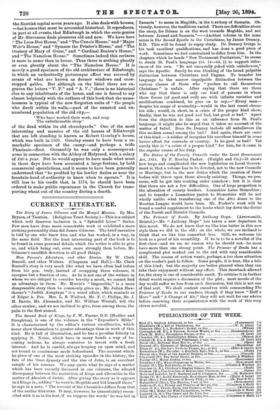The Second Book of Kings, by F. W. Farrar, D.D.
(Hodder and Stoughton), is one of the volumes in the "Expositor's Bible." It is characterised by the editor's various excellencies, which never show themselves to greater advantage than in work of this kind. He is full of illustration, and he has a peculiar felicity in applying it. Notes, which have in many hands a way of be- coming tedious, he always contrives to invest with a fresh interest. And he is candid, always keeping an open mind, and not bound to conclusions made beforehand. The account which he gives of one of the most striking episodes in the history, the fate of the Omri dynasty and the rise of John, is an excellent sample of his manner. We may quote what he says of a matter which has been recently discussed in our columns, the alleged discrepancy between the narratives of Kings and Chronicles in the matter of Ahaziah of Judah. After giving the story as it appears in 2 Kings ix., adding "he went to Megiddo and hid himself there," he says in a note, "The account of the Chronicles differs from that of the earlier historian. It may, however, be (uncertainly) recon- ciled with it as in the text, if we suppose the words he was hid in
E'amaria ' to mean in Megiddo, in the territory of Samaria. Ob- viously, however, the traditions varied. There are difficulties about the story, for Ibleam is on the west towards Megiddo, and not between Jezreel and Samaria."—Another volume in the same series is The Second Epistle to the Corinthians, by James Denney, B.D. This will be found to repay study. Dr. Denney brings to his task excellent qualifications, and has done a good piece of work. Sometimes we feel constrained to differ from him. In the chapters which he heads "New Testament Puritanism," he seems to strain St. Paul's language (vi. 14—vii. 1) to support infer- ences of his own. "Be not unequally yoked with unbelievers," says the Apostle. Surely he was thinking of the broad palpable distinction between Christians and Pagans. To transfer his language to the narrow impalpable distinction between the various classes of those who "profess to call themselves Christians" is unfair. After saying that there are those who say that there is only one kind of persons in whom these forces (of good and evil) are with infinite varieties and modifications combined, he goes on to say,—" Every man— despite his range of neutrality—would in the last resort choose his side ; would, in short, in a crisis of the proper End show, finally, that he was not good and bad, but good or bad." Apart from the objection to this as an inference from St. Paul's language, it might also be urged that it takes no account of the matter of belief. Does Dr. Denney include all unbelievers (in this mcdern sense) among the bad? And again, there are cases of this kind soldier of irregular life sacrifices himself in some heroic effort for comrade or country. Is he good or bad? Yet surely this is "a crisis of a proper kind" for him, for it came in the regular course of his duty.


































 Previous page
Previous page